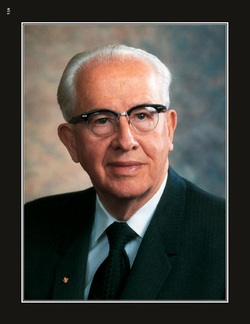
Did you know that both the flowers and leaves are edible? They're nice in a salad.
Next week I’ll post “Gardening 101”, info on finding a good spot for your garden, how to prepare the soil, and when to plant what.
After the recipes is a condensed version of an essay, "The Proper Role of Government", that President Benson wrote while an apostle. It is classic, timely, and every American, LDS or not, would be better off reading it. Please look it over. I know the principles in it are true.
-Rhonda
__________________________________
Honey Butter (simplest version)
8 oz. (2 sticks) butter, softened
8 oz. (3/4 c.) honey, room temperature
A tiny bit of salt and vanilla is good, too. Stir or whip until all smooth. Whipping it will give you a fluffier texture. Refrigerate.
This kind sometimes separates. Just stir it again to recombine. Or to keep it from separating, add either ½ c. powdered sugar or one egg yolk. The Lion House recipe calls for the egg yolk. It makes it silky-smooth, too. Make sure to use an egg with no cracks, then wash and dry it well before using in the recipe. Then using it raw will be safe.
Canadian White Honey
3 lbs (1 qt.) honey warmed just till softened
2 (7-oz.) jars marshmallow cream
1 cube softened butter or margarine
Combine all and whip until blended. Makes about 2 quarts.
To make true creamed honey, (which is EASY, just takes time for it to sit) see this video.
__________________________________
The Proper Role of Government
by The Honorable Ezra Taft Benson (excerpts)
Former Secretary of Agriculture to President Eisenhower
Published in 1968
See full text here.
THE MOST IMPORTANT FUNCTION OF GOVERNMENT It is generally agreed that the most important single function of government is to secure the rights and freedoms of individual citizens. But, what are those rights? And what is their source? Until these questions are answered there is little likelihood that we can correctly determine how government can best secure them. Thomas Paine, back in the days of the American Revolution, explained that:
"Rights are not gifts from one man to another, nor from one class of men to another… It is impossible to discover any origin of rights otherwise than in the origin of man." (P.P.N.S., p. 134)
Starting at the foundation of the pyramid, let us first consider the origin of those freedoms we have come to know are human rights. There are only two possible sources. Rights are either God-given as part of the Divine Plan, or they are granted by government as part of the political plan. Reason, necessity, tradition and religious convictions all lead me to accept the divine origin of these rights. If we accept the premise that human rights are granted by government, then we must be willing to accept the corollary that they can be denied by government. I, for one, shall never accept that premise. As the French political economist, Frederick Bastiat, phrased it so succinctly, "Life, liberty, and property do not exist because men have made laws. On the contrary, it was the fact that life, liberty, and property existed beforehand that caused men to make laws in the first place." (The Law, p.6)
A FORMULA FOR PROSPERITY
1. Economic security for all is impossible without widespread abundance.
2. Abundance is impossible without industrious and efficient production.
3. Such production is impossible without energetic, willing and eager labor.
4. This is not possible without incentive.
5. Of all forms of incentive – the freedom to attain a reward for one’s labors is the most sustaining for most people. Sometimes called THE PROFIT MOTIVE, it is simply the right to plan and to earn and to enjoy the fruits of your labor.
6. This profit motive DIMINISHES as government controls, regulations and taxes INCREASE to deny the fruits of success to those who produce.
7. Therefore, any attempt THROUGH GOVERNMENTAL INTERVENTION to redistribute the material rewards of labor can only result in the eventual destruction of the productive base of society, without which real abundance and security for more than the ruling elite is quite impossible.
BUT WHAT ABOUT THE NEEDY? On the surface this may sound heartless and insensitive to the needs of those less fortunate individuals who are found in any society, no matter how affluent. "What about the lame, the sick and the destitute? Is an often-voice question. Most other countries in the world have attempted to use the power of government to meet this need. Yet, in every case, the improvement has been marginal at best and has resulted in the long run creating more misery, more poverty, and certainly less freedom than when government first stepped in.
THE BETTER WAY By comparison, America traditionally has followed Jefferson’s advice of relying on individual action and charity. The result is that the United States has fewer cases of genuine hardship per capita than any other country in the entire world or throughout all history. Even during the depression of the 1930’s, Americans ate and lived better than most people in other countries do today.
FIFTEEN PRINCIPLES WHICH MAKE FOR GOOD AND PROPER GOVERNMENT
(1) I believe that no people can maintain freedom unless their political institutions are founded upon faith in God and belief in the existence of moral law.
(2) I believe that God has endowed men with certain unalienable rights as set forth in the Declaration of Independence and that no legislature and no majority, however great, may morally limit or destroy these; that the sole function of government is to protect life, liberty, and property and anything more than this is usurpation and oppression.
(3) I believe that the Constitution of the United States was prepared and adopted by men acting under inspiration from Almighty God; that it is a solemn compact between the peoples of the States of this nation which all officers of government are under duty to obey; that the eternal moral laws expressed therein must be adhered to or individual liberty will perish.
(4) I believe it a violation of the Constitution for government to deprive the individual of either life, liberty, or property except for these purposes:
(a) Punish crime and provide for the administration of justice;
(b) Protect the right and control of private property;
(c) Wage defensive war and provide for the nation’s defense;
(d) Compel each one who enjoys the protection of government to bear his fair share of the burden of performing the above functions.
(5) I hold that the Constitution denies government the power to take from the individual either his life, liberty, or property except in accordance with moral law; that the same moral law which governs the actions of men when acting alone is also applicable when they act in concert with others; that no citizen or group of citizens has any right to direct their agent, the government to perform any act which would be evil or offensive to the conscience if that citizen were performing the act himself outside the framework of government.
(6) I am hereby resolved that under no circumstances shall the freedoms guaranteed by the Bill of Rights be infringed. In particular I am opposed to any attempt on the part of the Federal Government to deny the people their right to bear arms, to worship and pray when and where they choose, or to own and control private property.
(7) I consider ourselves at war with international Communism which is committed to the destruction of our government, our right of property, and our freedom; that it is treason as defined by the Constitution to give aid and comfort to this implacable enemy.
(8) I am unalterably opposed to Socialism, either in whole or in part, and regard it as an unconstitutional usurpation of power and a denial of the right of private property for government to own or operate the means of producing and distributing goods and services in competition with private enterprise, or to regiment owners in the legitimate use of private property.
(9) I maintain that every person who enjoys the protection of his life, liberty, and property should bear his fair share of the cost of government in providing that protection; that the elementary principles of justice set forth in the Constitution demand that all taxes imposed be uniform and that each person’s property or income be taxed at the same rate.
For the other principles see here.

 RSS Feed
RSS Feed